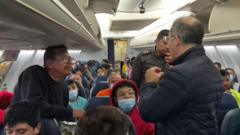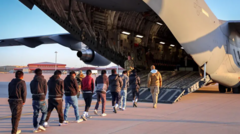A recent diplomatic spat over deportation flights reveals deep divisions in U.S.-Colombia relations, exemplified by President Petro's bold decision to reject military planes carrying deportees.
Colombia's Diplomatic Dilemma: A Tense Showdown with Trump

Colombia's Diplomatic Dilemma: A Tense Showdown with Trump
President Gustavo Petro faces backlash after denying U.S. deportation flights, escalating tensions with the Trump administration.
On Sunday, Colombian President Gustavo Petro stirred diplomatic tensions with the United States when he turned back two American military aircraft designated for carrying deportees. This decision not only angered President Trump but also caught many within Petro’s inner circle by surprise, marking a tumultuous moment in Colombia's political landscape.
Former President Álvaro Uribe, a notable political rival of Petro, joined the efforts to stabilize U.S.-Colombia relations, reaching out to contacts in Washington to mitigate the fallout from this fraught situation. Late on the same day, it appeared that a resolution was in sight when the White House announced that the Colombian government had consented to accept all deportation flights, including those operated by the military. This prompted the Colombian Foreign Ministry to declare that "the impasse" had been resolved.
Colombia’s Ambassador to the United States, Daniel García-Peña, emphasized the importance of diplomatic engagement, stating, “Despite the difficulties we had, it’s proof that diplomatic channels continue to be the best way to sort out differences.” García-Peña was actively involved in back-channel discussions between President Petro and the Trump administration, acting as a bridge to ensure communication remained open amidst escalating tensions.
As discussions unfolded, García-Peña expressed hope for a positive trajectory in U.S.-Colombia relations moving forward. However, the unrest from the incident is likely to linger, showcasing the fragility within diplomatic ties during this politically charged period.
Former President Álvaro Uribe, a notable political rival of Petro, joined the efforts to stabilize U.S.-Colombia relations, reaching out to contacts in Washington to mitigate the fallout from this fraught situation. Late on the same day, it appeared that a resolution was in sight when the White House announced that the Colombian government had consented to accept all deportation flights, including those operated by the military. This prompted the Colombian Foreign Ministry to declare that "the impasse" had been resolved.
Colombia’s Ambassador to the United States, Daniel García-Peña, emphasized the importance of diplomatic engagement, stating, “Despite the difficulties we had, it’s proof that diplomatic channels continue to be the best way to sort out differences.” García-Peña was actively involved in back-channel discussions between President Petro and the Trump administration, acting as a bridge to ensure communication remained open amidst escalating tensions.
As discussions unfolded, García-Peña expressed hope for a positive trajectory in U.S.-Colombia relations moving forward. However, the unrest from the incident is likely to linger, showcasing the fragility within diplomatic ties during this politically charged period.






















